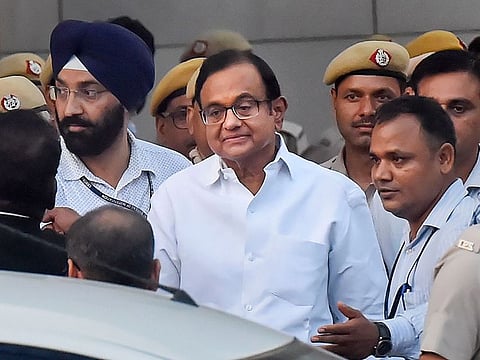The significance of Chidambaram’s arrest and aftermath
His experience will hang like a sword over the heads of other Indian opposition leaders

By the time this article comes out, a former finance minister and home minister of India and a prominent Congress leader, P. Chidambaram, is likely to emerge from 5-day custody of the Central Bureau of Investigation.
(Chidambaram’s CBI custody has been extended till August 30 by Delhi court).
The CBI is investigating money laundering charges related to INX Media, owned by Indrani Mukherjea and Peter Mukherjea, both of whom are serving time in cases related to the murder of Indrani’s daughter Sheena Bora. Indrani, who turned approver, now says the former finance minister asked her to channel funds through companies run by his son, Karti Chidambaram. Chidambaram has denied the charges.
No matter, the drama continues. And its plot is the stuff of a well-made Hollywood movie. In 2010, as home minister of India, Chidambaram, had Amit Shah, then a minister in Narendra Modi’s cabinet in their home state of Gujarat, arrested and interrogated by the CBI in a ‘fake encounter’ case that resulted in the murder of Sohrabuddin Sheikh. The case continues to be a cause championed by activists. Shah spent months in jail, and when he came out on bail, was banned from entering Gujarat for two years. Later, in December 2014, a CBI court exonerated Shah of the charges. Modi had come to power by then.
That the CBI is a tool in the hands of those in power is clear from the instances above. And the CBI is not the exception. A lion’s share of India’s public institutions is run not on governance values. It is easy to blame the employees for this great lapse. But if they are not protected in the dispensation of their duties, there is little they can do to stay and steer, well, the righteous course.
Chidambaram out on bail soon, nevertheless, would have come out a chastened, humbler man. Humility has never been his forte. Years ago, Chidambaram famously said that all that Modi knew of economics could be written on the back of a postage stamp. Recently, in Parliament, he made little of the finance minister, Nirmala Sitharaman’s claims to making Indian economy worth $5 trillion. The message that a post-bail Chidambaram brings to his friends and comrades will not be encouraging. And with the Congress, as of now and in all likelihood for the next 10 years, in a state of decimation, the Chidambaram experience will hang like a sword over the heads of the leaders of the Opposition. Almost all the top leaders including Sonia Gandhi, Rahul Gandhi, and Shashi Tharoor have cases pending against them. Amit Shah is an extremely intelligent and efficient political machine. He knows the forces and means at his command, and will not hesitate to use these as and when.
As and when is all the time. India’s economy is not doing well. Private investment, private consumption, exports are down. Only government investments in infrastructure seem positive. If the Modi government continues to fail on the economic front, it will have no alternative but to radicalise its political moves even more in the ‘Right’ direction as this will both distract attention and at the same time keep up the morale of its constituencies high. Nationalism nips many a budding revolt.
All around, there is anxiety. The liberals have played themselves out. I had warned of the fallout of ‘demonising Modi’, as a Congress leader, Jairam Ramesh, put it last week. Ramesh said Modi connects with people and that to vilify everything he does is counterproductive. They haven’t, as is the case with the painlessly secular and the permanently righteous intelligentsia, got the point yet.
It is not just a question of demonising Modi. The Indian State has changed its nature. It is turning harder by the day in internal and external matters. The Indian prime minister is one of the greatest contemporary salesmen of hope. Congress and the rest come across as obstacles to progress. That image has to change. Not easy. The Indian media, always at their best when not contested, is with the Modi regime. The ever-critical NGO sector is squeezed for funds thanks to government strictures. The Indian polity is sold on Modi. That leaves the minuscule fellowship-intellectuals and New York Times/Washington Post columnists. They are guilty of the same mistake as the Opposition.
If India wants to correct its course, one of the first things to have is a nuanced, civil discourse. This would be not achievable in these extreme, polarised times, without a centrist, mediating ground. Within Parliament and outside, talking terms need to change, feelings mended, new analytical tools shaped. The ground between stooges and separatists, nationalists and treasonists, has to be forged. This will take more than what the left and the right have so far shown to have in them. But if democracy in India is to survive in any recognisable shape, a third force has to emerge. And not so far in the future.
— C.P. Surendran is a senior journalist based in India
Sign up for the Daily Briefing
Get the latest news and updates straight to your inbox



